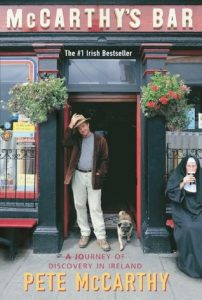In which we swear off fast food forever.

Fast Food Nation is a book calculated to make you lose your appetite. On the other hand there is such a lot of talk of hamburgers and fries (and tacos and pizzas) that it’s very difficult not to obsess about food while reading it. A somewhat mixed experience, in that respect.
A somewhat mixed experience in many respects, actually. The book’s adequately well written, not in itself a very compelling read, but once I got into it I found it hard to put it down because I wanted to be done with it and go on to something more pleasant. It seems thoroughly researched, and I can’t really see any reason to doubt the main gist of Schlosser’s argument – that the fast food industry is bad for just about everything: The food’s unhealthy (whenever it isn’t lethal), the workers are unhappy and the effect on the economy as a whole is negative too.
Successful in it’s bid to make you averse to entering a fast food «restaurant» ever again, I still found the book patchy in its arguments. In fact, the whole «feel» was spoiled by just one jarring episode; Schlosser visits a slaughterhouse and gets a guided tour, starting at the «wrong end» in the packaging room and getting progressively closer to where «meat» is still «cattle». This description could have been very effective if he’d left the focus on the knocker, for example – stunning hundreds of cattle a day (up to 400 an hour), every day, must be a pretty terrible sort of job to do, even for the most determined carnivore. But this is where Schlosser slips into sentimentality, he exits the «plant» the way the cattle come in, and spends some time expounding the way the big brown eyes look at him, the way the ramp is designed so that the cattle do not see what’s coming. Now, I eat meat. I would prefer not to have to slaughter the animal myself prior to eating it, but I would if I had to. I have no illusions about the steak or bacon I buy at the supermarket, I know perfectly well that a short while ago this bit of meat was part of a (hopefully) healthy, (hopefully) happy, (definitely) living, breathing animal. Such is life. If it bothered me I would become a vegetarian.
The fact that the system is condusive to mistreatment of the animals, poor conditions for the workers, all sorts of odds and ends ending up in the food (bone, gristle, excrement, glass, what-have-you) and one small sample infected with e-coli 0157:H7 making millions of hamburgers lethal bothers me in the extreme, and the uncovering of all this makes the book interesting reading. The fact that the hamburger I eat was once part of a cow (or more likely hundreds of cows), bothers me not one iota, and the descent into sentimentalism mars what was otherwise a persuasive read.
But it will be a while before I eat at McDonald’s again.
 Or was it travel? Having finished Tony Hawks I thought some more travel-in-Ireland was in order and therefore reread Pete McCarthy’s McCarthy’s Bar, where, amongst other things, he lays out a few of the rules of travel. The one that gives the book its name is ‘8. Never pass a bar which has your name on it.’ An admirable sentiment, though somewhat more useful if your name is Pete McCarthy than if it’s Ragnhild Sandlund. Never mind.
Or was it travel? Having finished Tony Hawks I thought some more travel-in-Ireland was in order and therefore reread Pete McCarthy’s McCarthy’s Bar, where, amongst other things, he lays out a few of the rules of travel. The one that gives the book its name is ‘8. Never pass a bar which has your name on it.’ An admirable sentiment, though somewhat more useful if your name is Pete McCarthy than if it’s Ragnhild Sandlund. Never mind.

 I found
I found 
